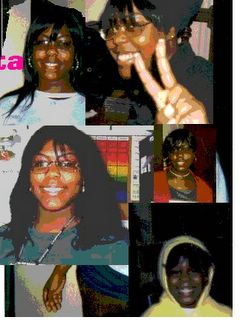Water Get No Enemy

Come with me as I revisit one of my favorite artists.
Fela Anikulapo Kuti Tribute
July 31, 2003
In the summer of 1997 the requiems seemed peculiarly endless: Gianni Versace, Princess Diana, Mother Teresa, and Betty Shabazz. But the death of Fela Anikulapo Kuti resonated throughout the black musical community like none other. When he lost his battle against AIDS on August 2, Nigeria mourned the passing of their “Black President” and the world grieved the death of a political icon. Over one million gathered at his funeral procession in his homeland.
Jump to today: AIDS is considered a pandemic and Kuti is being honored as one of the most influential musicians and leaders in African history. For instance, the tribute album Red Hot and Riot compiles remakes of his material recorded by a dynamic cast of contemporary artists including D'Angelo, Sade, Cheikh Lo, Les Nubians, Res, Kelis, and Common. The fourteenth of its kind, the CD was released by the Red Hot Organization, an institution that incorporates popular culture into its AIDS annihilation message.
With a career that spanned well over three decades, Kuti excelled as a singer, songwriter, composer, dancer, musician and activist. He fronted the vanguard that is the Afrobeat sound. With his anti-establishment stance, he lit the political world on fire and begat album after album that sonically flogged the Nigerian government.
From his youth, it seemed that Kuti was set to defy the status quo. Born in 1938 in Abeokuta, Nigeria to parents who were committed nationalists during the colonial movement, the soon-to-become musical master went to London to study medicine. It was as his parents intended, but his own mother, Funmilayo, was a feminist and labor organizer. Surely she inspired her son's own fiery brand of nationalism. Soon after his arrival in London, Kuti enrolled in Trinity College, immersing himself in music, and eventually mastering the saxophone, trumpet, and piano. This is also when he united an energetic posse of 20 instrumentalists and 27 singers and dancers. His original group, which he called Koola Lobitos, toured and enjoyed mild success.
On a visit to the United States with friend Sandra Iszadore, he mused with the likes of James Brown and Angela Davis. The catalytic Black Arts and Civil Rights movements sparked an ideaology that would define Kuti. Upon his return to Africa, Kuti's band changed their name to Nigeria 70 and later to Afrika 70. He began to live impossibly on-edge, challenging the Nigerian regime, on and off wax. Any given album was guaranteed a kinetic hour or so of recorded revolutionary rapture. Some most memorable gems were "Yellow Fever," "Gentleman," "Shakara," and "Coffin For Head Of State." Much of his work was banned from air play and was barely promoted. Many of Kuti's fans saw him perform primarily at Afrika Shrine, a night club he founded. It became a musical refuge and a communal site for Kuti and his band.
By 1970 Fela wanted to create a haven for more than just clubgoers. He built an entire community (complete with a hospital) and fortified it with an electric barb fence. Boldly, Kuti proclaimed his compound a state, naming it Kalakuta Republic.
Kuti's new promised land thrived for only six years. In 1976, the Nigerian government held the Second World Black Festival of Arts and Culture (FESTAC) as a strategy to gain notoriety as a Sub-Saharan cultural leader. Kuti refused his invitation and instead threw his own festival where he debuted his incendiary song "Zombie." Just days after the festival, the Nigerian government retaliated with a raid of 1,000 soldiers who set fire to the Kalakuta, beat Kuti unconsciously, and threw his 82-year-old mother (who later died from her injuries), and brother from a window. Kuti was hospitalized, jailed, and later self-exiled in Ghana. When he finally returned, it was to create a political party, the Movement for the People. It was banned from running in elections.
Though his political ideals became remnants of the past, his progressive message lives on in the music of his son, Seun Kuti. His other son, Femi Kuti, has branched off with his own musical notions of Afrobeat. Both were members of their father's last musical ensemble.
And the fervor of Kuti's message has inspired the work of others on the opposite side of the world. Up until recently, Kuti's awesome legacy had been celebrated in New York on a monthly basis with a rousing jam dubbed Jump 'n Funk. Rich Medina, a tremendous Afrobeat fan, was the record selector for the monthly New York City gathering that honored Kuti at Club Shine. The parties served as fundraisers for an interactive traveling Kuti exhibit currently underway.
"He had a very heavy political agenda," says Medina "another shining example of black rage in the face of really daunting circumstances. Modern day black Americans have a romance with struggle that this music feeds, Nigerians young and old still face some of the dilemmas that he speaks of so loudly in his music."
Paul D. Miller, aka DJ Spooky, a New York-based conceptual artist, writer, and musician, is another Kuti enthusiast. "I like to think of him as a social sculptor," says Miller, "mixing first world, second world, third world zones. He had to create a whole new country to contain his sounds. He created a new mindset-a virtual space of the mind made into a small utopian spot in Nigeria where his crew could come up with new ideas in rhythm. He flipped a sound into a whole new dimension of culture."


0 Comments:
Post a Comment
<< Home